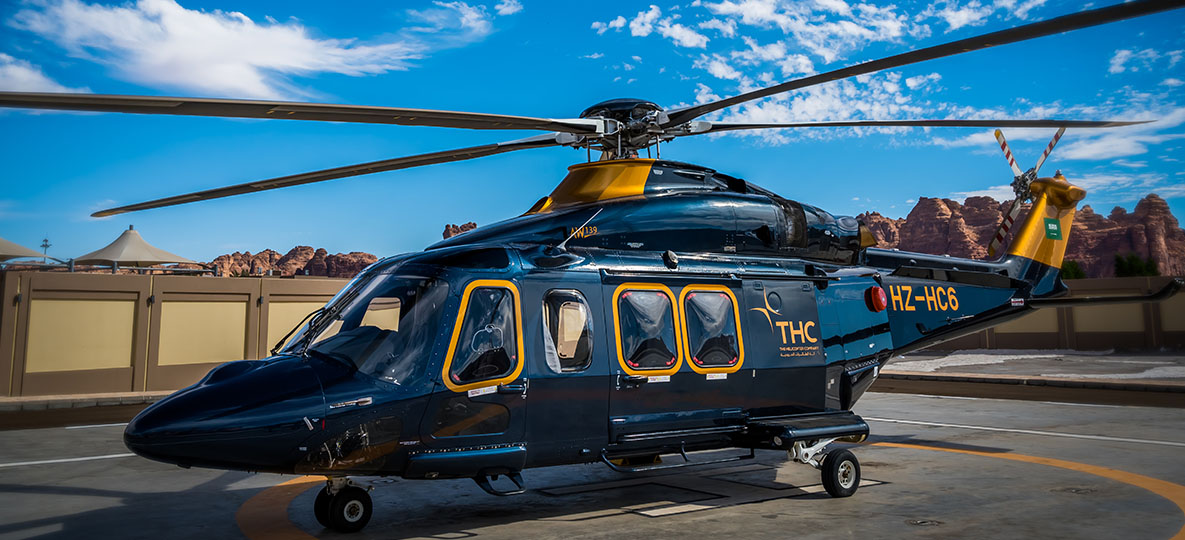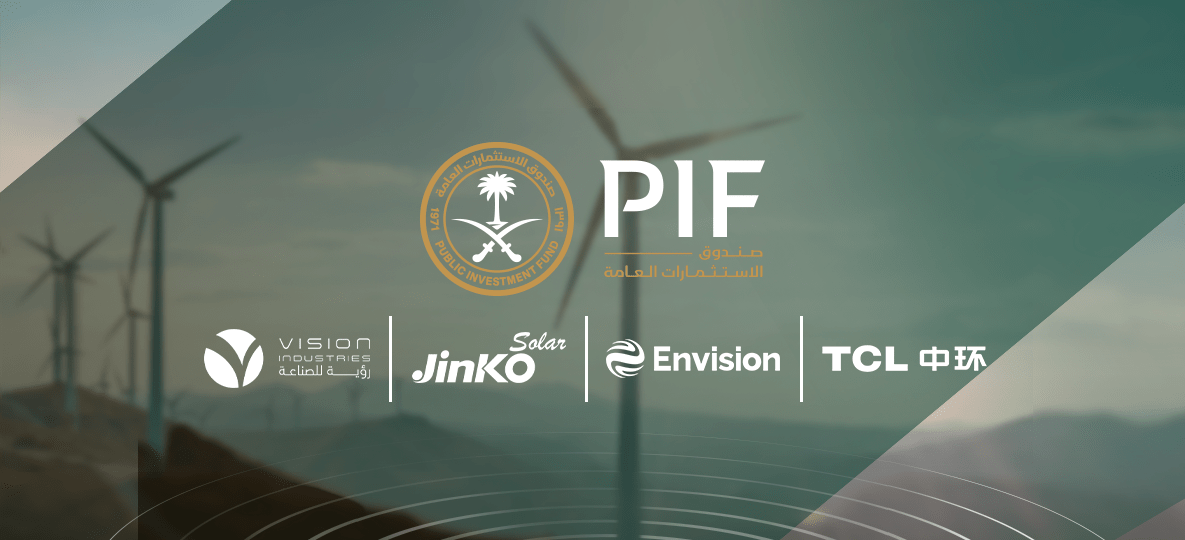Discover how a helicopter company is flying Saudi Arabia to new horizons
- The Helicopter Company (THC) provides a wide scope of commercial helicopter services, including emergency medical services
- The PIF-owned company is creating impactful career opportunities to help pilot future-ready industries
- THC aligns with PIF’s strategy to boost Saudi Arabia’s aviation ecosystem
“Saudi Arabia is moving so fast, it’s like we are in a time machine,” says Shayia Maqbool, Director of Flight Operations for The Helicopter Company (THC). “Every time I fly, I see something different.”
But Maqbool isn’t just witnessing change. He’s helping to pilot it.
With its ever-growing fleet and support from PIF, THC is contributing to the transformation of the Saudi aviation industry. It offers a wide range of commercial helicopter services, from emergency medical services to infrastructure support, corporate charters and scenic tours.
When Maqbool lifts off, he doesn’t just fly from one destination to the next. He races to people in need of urgent medical care, takes architects to see their projects from a bird’s-eye perspective, brings video crews high above marathon runners in places like the ancient city of AlUla, and pilots archaeologists to hard-to-reach locations.
“There is no other job like this. Every time you fly, you’re saving people, doing something for your community, and seeing the transformation happening in Saudi Arabia,” says Maqbool.
Preparing for progress
Maqbool says that like many young people growing up in Saudi Arabia, he “was always fascinated by flying.” Once he started studying aviation, he discovered how much such a career could contribute to his country.
“We have the right ingredients to have a very prosperous aviation sector,” says Maqbool. “We have a widespread landscape and big cities. We have the airspace. People can afford to fly. But aviation was underutilized for a long time. Now, that’s changing.”
According to the International Air Transport Association (IATA), the aviation sector could contribute as much as $125.5 billion to the Saudi economy by 2037 – and significant amounts have been invested to develop the country as a global aviation hub.
In March 2023, PIF announced the launch of Saudi Arabia’s new national carrier, Riyadh Air, which is expected to make its first commercial flight in early 2025, and serve more than 100 global destinations by 2030. The Fund is supporting Riyadh’s six-runway King Salman International Airport, which will be one of the world’s largest once complete; in 2022, PIF launched AviLease, a global aircraft leasing company that gives airlines flexibility to rent planes and manage their fleet to respond to demand.
Meanwhile, forward-looking investments in infrastructure – from building hospitals and hotels with helipads to purchasing helicopters compatible with biofuels – are creating a future-ready industry.
“The general aviation sector has a socioeconomic impact beyond GDP and is considered strategic by PIF,” says Muhammad Ovais Yousuf, Head of Aviation and Security Sector, MENA Investments Division, PIF. “We believe it will be a strong catalyst for multiple sectors that contribute significantly to the Kingdom’s economy.”
Since THC was founded, Yousuf adds, it has put 47 helicopters into service, and aims to manage more than 100 by 2026, with a fleet expansion of 18 aircraft announced ahead of the 2023 Dubai Airshow. The company has 700+ employees as of late 2023.
From pilots to aircraft technicians, these are some of the first of up to 1.2 million additional jobs the Saudi aviation industry could attract, according to IATA, over the next 15 years. And more are on the way.
“THC has proudly introduced a world-class cadet training program to develop young Saudi talent for pilot and mechanic roles, with two cohorts completed to date,” says Yousuf.
Since joining THC in 2020, Maqbool has witnessed exponential growth within both the company and the sector. “THC has pilots from all over the world representing 33 different nationalities,” he says. “We’re bringing all this expertise – all this collective experience – into one location and learning from each other.”
“The knowledge transfer has been incredible. We’re writing it all down and creating a strong foundation for our next generation [of aviation leaders],” he says.
Improved infrastructure from the skies
Maqbool has plenty of personal knowledge and experience to share. At THC, he has so far saved 22 lives while performing emergency medical missions – some of the 1,640 people he estimates the company has helped to save as part of the National Air Medical Program, which THC operates in collaboration with the Saudi Red Crescent Authority (SRCA), which is chaired by Saudi Arabia’s Minister of Health.
“In these situations, it’s a race against time,” he says. “But with our helicopter fleet, now we can get people who were involved in serious accidents to a trauma center in minutes. It’s a badge of honor for us pilots.”
The helicopter fleet has also allowed Saudi Arabia to better integrate its medical services, giving those who live outside of Riyadh, Jeddah, and other big cities access to high-quality emergency care. Maqbool says THC can travel within a 185-nautical-mile radius from Riyadh, for example – “a huge development for healthcare.”
One of the most harrowing journeys Maqbool recalls took him much further afield than Riyadh, however. When THC received a Mayday call from archaeologists whose off-road buggy had flipped over, he led three helicopters deep into the Empty Quarter – the vast desert expanse where the sun beats down and sand dunes shimmer like an endless sea.
“One of them had a serious injury, but they had lost their location and needed a helicopter search,” he says. “We were able to locate them quickly and sent paramedics. Fortunately, everyone survived.”

Building the future
Maqbool is proud to play a part in improving Saudi emergency medical services. But he’s just as proud to help the country evolve in other ways.
From Tabuk to Asir, the country’s mountains are famously rugged. They also contain ancient secrets that scientists are only just discovering, often with the help of pilots like Maqbool. He regularly takes researchers high above the hills – in what are some of the hardest missions to fly.
Without the expertise he contributes, the treasures these sites contain might remain hidden forever.
“Being part of exploration projects is totally amazing,” he says. “Imagine helping archaeologists find relics and sites that are thousands of years old. There’s so much we’ve yet to discover.”
There’s even more happening in the present that could propel the Kingdom ahead in the future. Giga-projects like the NEOM zone in north-west Saudi Arabia, The Red Sea tourism project, and more are reshaping and catalyzing numerous industries. THC is helping to facilitate these developments by giving architects full-frame views of their projects, and will support future tourism initiatives through charter services across many properties.
With support from both public and private groups, Maqbool is bullish on Saudi Arabia’s ability to become a global hub for aviation. Riyadh Air, THC and aviation infrastructure projects all play into PIF’s vision to create a globally competitive aviation sector “that enables the success of Saudi’s Vision 2030, delivers sustainable financial and economic returns [and makes Saudi Arabia] an international hub for trade and transport networks,” according to Yousuf.
For now, Maqbool continues to live out his dream by expanding Saudi emergency medical services, enabling exciting new experiences, and bringing people to once unreachable destinations. “One day, I believe this country could be the center of the whole aviation industry,” he says. “This job is everything a pilot could want.”
Produced for PIF by BBC StoryWorks Commercial Productions
-
Press Releases
23 July 2024Fahad AlSaif appointed Head of PIF’s Investment Strategy and Economic Insights Division -
Press Releases
16 July 2024PIF strengthens renewable energy localization in Saudi Arabia with three new joint ventures -





